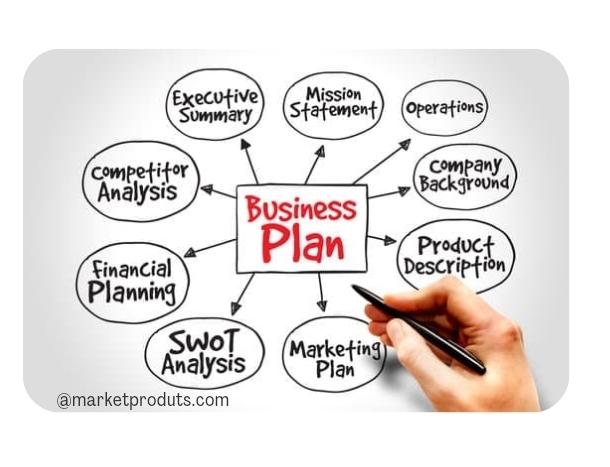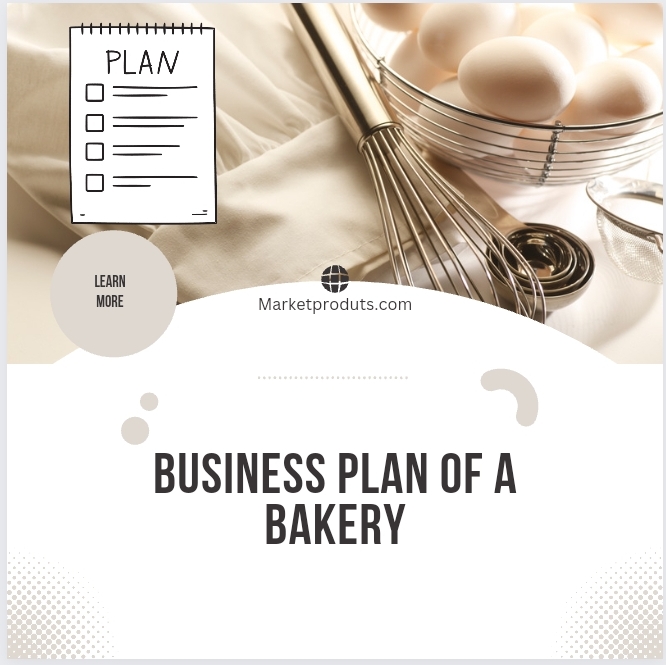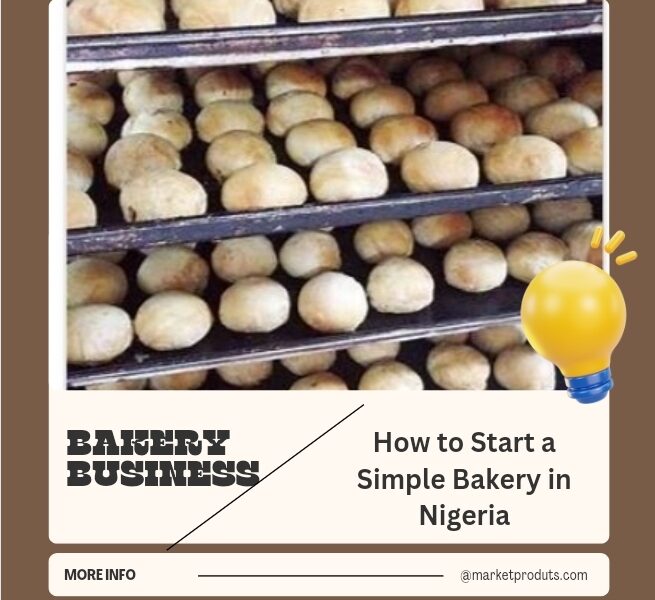Starting a bakery is not just about baking delicious treats; it requires careful planning and execution to turn your passion into a successful business venture. In this article .we will explore into the essential components of creating a very good Business Plan of a Bakery.
When embarking on the journey of starting a bakery, having a well-thought-out business plan is crucial. It serves as a roadmap, guiding you through the various stages of establishing and running your bakery efficiently.
Importance of a Business Plan
A good Business Plan of a Bakery outlines your goals, strategies, and operational procedures, providing clarity and direction for your bakery venture. It helps you anticipate challenges, identify opportunities, and make informed decisions along the way.
The Complete Business Plan of a Bakery

Before diving into the specifics of your business plan, it’s essential to understand the dynamics of the bakery industry. With an increasing demand for artisanal baked goods and specialty treats, the bakery sector offers ample opportunities for growth and innovation.
Market Research and Analysis
Before opening your bakery doors, conducting thorough market research is imperative to understand your target audience and competition.
Identifying Target Market Demographics
Identify the demographics of your target market, including age, income level, and preferences. This information will help tailor your products and marketing strategies to appeal to your target customers effectively.
Read more: How Much Does It Cost To Start A Bakery In Nigeria -The Complete Bakery Business Plan
Analyze existing bakeries in your area to assess their strengths, weaknesses, and market positioning. Identify gaps in the market that your bakery can fill, whether it’s offering unique flavors or catering to specific dietary restrictions.
Setting Clear Goals and Objectives
Establishing clear goals and objectives is essential for charting the course of your bakery business and measuring its success.
Short-term and Long-term Goals
Define both short-term and long-term goals for your bakery, such as increasing sales revenue, expanding your product line, or opening additional locations.
SMART Objectives
Ensure that your goals are Specific, Measurable, Achievable, Relevant, and Time-bound (SMART). This framework will help you set realistic targets and track your progress effectively.
Choosing a Suitable Location
Where your bakery is located can significantly impact its success. Carefully evaluate potential locations based on various factors.
Read more: How to start a simple bakery in Nigeria
Factors to Consider in Location Selection
Factors such as foot traffic, visibility, cars parking availability should be considered, and the proximity to complement businesses. Choose a location that offers convenience and accessibility to your target customers.
Assessing Foot Traffic and Accessibility
Observe foot traffic patterns in potential locations to gauge the level of customer activity. Additionally, ensure that your bakery is easily accessible by both pedestrians and vehicles.
Product Offering and Menu Development

Your bakery’s menu plays a crucial role in attracting customers and generating revenue. Create a diverse and enticing menu that caters to different tastes and preferences.
Variety of Baked Goods
Offer a wide variety of baked goods, including bread, pastries, cakes, cookies, and specialty items. Experiment with unique flavors and ingredients to set your bakery apart from the competition.
Specialty Items and Seasonal Offerings
Introduce specialty items and seasonal offerings to capitalize on changing consumer preferences and holidays. Limited-time offerings create a sense of urgency and excitement among customers, driving sales and fostering loyalty.
Equipment and Supplies
Investing in high-quality equipment and sourcing premium ingredients are essential for producing top-notch baked goods.
Necessary Bakery Equipment
Acquire essential bakery equipment such as ovens, mixers, refrigerators, and display cases. Opt for equipment that meets your production needs and adheres to industry standards for quality and safety.
Sourcing Quality Ingredients
Source fresh, high-quality ingredients from reputable suppliers to ensure the superior taste and texture of your baked goods. Establish partnerships with local farmers and producers to support sustainable and ethically sourced ingredients.
Staffing and Training
Your bakery’s staff plays a critical role in delivering excellent customer service and maintaining operational efficiency.
Assess your bakery’s staffing needs based on factors such as anticipated sales volume, operating hours, and workload. Hire a diverse team of skilled individuals who are passionate about baking and committed to providing exceptional service.
Training Protocols for Employees
Implement comprehensive training programs to equip your staff with the necessary knowledge and skills to perform their roles effectively. Provide ongoing training and development opportunities to foster a culture of continuous learning and improvement.
Marketing and Branding Strategy
Effective marketing and branding are essential for building brand awareness, attracting customers, and driving sales.
Establishing a Unique Brand Identity
Develop a distinct brand identity that reflects the personality and values of your bakery. Create a memorable logo, signage, and packaging design that resonates with your target audience and sets your bakery apart from competitors.
Promotional Tactics and Advertising Channels
Utilize a mix of traditional and digital marketing channels to promote your bakery and reach potential customers. Consider strategies such as social media marketing, email campaigns, local advertising, and partnerships with other businesses or organizations.
Financial Planning and Budgeting
Sound financial planning is crucial for ensuring the sustainability and profitability of your bakery business.
Estimating Startup Costs
Calculate the initial investment required to start your bakery, including equipment purchases, leasehold improvements, inventory, and marketing expenses. Develop a detailed budget to track your expenditures and allocate resources effectively.
Creating a Financial Forecast
Prepare a financial forecast that projects your bakery’s revenue, expenses, and cash flow over the first few years of operation. Use realistic assumptions and conservative estimates to ensure accuracy and reliability.
Legal and Regulatory Considerations
Navigating the legal and regulatory landscape is essential for compliance and risk management in the bakery industry.
How To Obtain Necessary Permits and Licenses
Research and obtain all required permits and licenses for operating a bakery in your jurisdiction. This may include health permits, food handling certifications, zoning approvals, and business licenses.
Compliance with Health and Safety Regulations
Adhere to strict health and safety regulations to maintain a clean and sanitary environment in your bakery. Implement proper food handling practices, sanitation protocols, and employee training to ensure compliance with regulatory standards.
Operations Management
Efficient operations management is key to streamlining workflow, optimizing productivity, and delivering consistent quality.
Daily Workflow and Procedures
Establish standardized procedures for every aspect of your bakery’s operations, from ingredient preparation to customer service. Clearly define roles and responsibilities to minimize confusion and maximize efficiency. This is one of the good Business Plan of a Bakery, don’t forget it.
Inventory Management and Quality Control
Implement inventory management systems to track ingredient usage, monitor stock levels, and prevent wastage. Conduct regular quality control checks to ensure that your baked goods meet the highest standards of freshness and taste.
Customer Experience and Feedback
Providing an exceptional customer experience is essential for building customer loyalty and fostering positive word-of-mouth.
Providing Exceptional Customer Service
Train your staff to deliver friendly, attentive service that exceeds customer expectations. Offer personalized recommendations, engage with customers on social media, and solicit feedback to enhance the overall experience.
Gathering and Analyzing Customer Feedback

Encourage customers to provide feedback through surveys, reviews, and comment cards. Analyze this feedback to identify areas for improvement and implement changes that enhance customer satisfaction and loyalty.
Adapting to Market Trends
Staying attuned to evolving consumer preferences and industry trends is crucial for staying competitive in the bakery market.
Embracing Innovation and New Trends
Stay abreast of emerging trends in baking techniques, flavors, and dietary preferences. Experiment with innovative recipes and ingredients to keep your menu fresh and exciting for customers.
Flexibility in Product Offerings
Be flexible and responsive to changes in consumer demand and market conditions. Adjust your product offerings and marketing strategies accordingly to capitalize on new opportunities and stay ahead of the competition.
Sustainability Practices
Implementing sustainable practices not only benefits the environment but also enhances your bakery’s reputation and appeal to eco-conscious consumers.
Environmentally Friendly Initiatives
Reduce your bakery’s carbon footprint by implementing energy-efficient practices, such as using eco-friendly packaging, reducing food waste, and recycling materials. Business Plan of a Bakery, Consider sourcing locally grown ingredients to support sustainable agriculture and reduce transportation emissions.
Waste Reduction and Recycling Efforts
Minimize food waste by carefully managing inventory, portion sizes, and production processes. Donate excess food to local charities or compost organic waste to divert it from landfills. Implement recycling programs for packaging materials, paper products, and other waste streams.
Monitoring and Evaluation
Regularly monitoring and evaluating your bakery’s performance is essential for identifying strengths, weaknesses, and opportunities for improvement.
Regular Review of Business Performance
Review key performance indicators (KPIs) such as sales revenue, profit margins, customer satisfaction scores, and inventory turnover regularly. Use this data to assess your bakery’s performance relative to your goals and benchmarks.
Making Adjustments and Improvements

Based on your performance analysis, identify areas where your bakery is excelling and areas where there is room for improvement. About Business Plan of a Bakery Make strategic adjustments to your operations, marketing strategies, and product offerings to optimize performance and achieve your business objectives.
Conclusion
Creating a comprehensive Business Plan of a Bakery is very essential for successfully launching and operating a bakery business. By carefully considering factors such as market research, location selection, product development, staffing, marketing, financial planning, and sustainability, you can lay the groundwork for a thriving bakery venture. Remember to stay adaptable, responsive to customer feedback, and vigilant in monitoring your bakery’s performance to ensure long-term success.
FAQs
- How do I determine the target market for my bakery? Conduct market research to identify demographics such as age, income level, and preferences. Analyze competitors and assess gaps in the market that your bakery can fill.
- What equipment do I need to start a bakery? Essential bakery equipment includes ovens, mixers, refrigerators, and display cases. Invest in high-quality equipment that meets your production needs and adheres to safety standards.
- How can I attract customers to my bakery? Develop a unique brand identity, offer a diverse menu of baked goods, and utilize marketing tactics such as social media, email campaigns, and local advertising to attract customers.
- What are some cost-saving measures for a bakery business? Minimize food waste, negotiate favorable supplier contracts, and optimize staffing levels to control labor costs. Implement energy-efficient practices to reduce utility expenses.
- How do I ensure food safety and compliance in my bakery? Obtain necessary permits and licenses, adhere to strict health and safety regulations, and implement proper food handling and sanitation protocols. Conduct regular inspections and training to maintain compliance.



